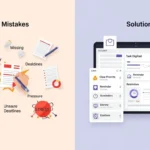Guide to Managing Remote Employees in Compliance with Saudi Labor Laws
In the digital transformation era, remote work has become a vital necessity for many organizations worldwide, especially in Saudi Arabia, where its adoption is rapidly growing. The Ministry of Human Resources and Social Development supports this shift through the Remote Work platform, which provides a structured legal framework connecting national companies with local talent and ensuring full compliance with labor and Saudization regulations. However, successfully managing remote teams requires a comprehensive operational framework that goes beyond communication tools to include accurate performance tracking, contract management, and work hour documentation in line with local legislation.
What is remote work in the Saudi context?
According to the Ministry of Human Resources and Social Development, remote work is defined as:
“Performing agreed-upon job duties between the employer and employee from a location other than the main workplace, using information and communication technologies, under a documented official contract.”
This definition places remote work within the framework of the Saudi Labor Law, making it subject to Saudization and localization requirements just like any on-site job—provided it is conducted through official approved channels such as the Remote Work Platform.
Saudi Ministry of Human Resources Remote Work Regulations
Remote work management in Saudi Arabia is not an open-ended choice, but rather a structured legal framework governed by the Ministry of Human Resources and Social Development. It is designed to protect the rights of both employees and employers while ensuring effective Saudization.
Conditions for Hiring a Remote Employee
To legally hire a Saudi remote employee, the following conditions must be met:
- Employment must be conducted through the officially approved “Remote Work” platform by the Ministry of Human Resources.
- The employee must be a Saudi national and registered with the Social Insurance system (GOSI).
- An electronic employment contract must be signed and documented through the platform.
- The employee must perform their work outside the company’s main premises, within the geographic boundaries permitted by the platform.
Regulatory Requirements for Remote Work Contracts
The contract signed with a remote employee must include clear terms that comply with approved laws and regulations, including:
Working hours: No less than 168 hours per month for full-time positions, with the option to define part-time arrangements based on mutual agreement.
Salary: Must not be lower than the minimum wage set under the Saudization (Nitaqat) program.
Leave entitlements: The employee must receive the same rights to annual, sick, and official leave as on-site employees.
Social insurance: Registration with the General Organization for Social Insurance (GOSI) is mandatory.
Job responsibilities: Tasks must be clearly defined and suitable for efficient remote execution.
To ensure full compliance with regulations, the platform requires organizations to:
- Upload employment contracts and monitor employee registration electronically through the platform.
- Track working hours and submit regular performance reports for remote employees.
- Use officially approved service providers to manage and monitor remote employee performance.
- Document all remote work–related activities to ensure transparency and alignment with Saudization requirements.
Compliance with these regulations is not optional—it is a legal obligation to ensure business sustainability and avoid violations or penalties.
Recommended Tools for Managing Remote Employees

Why Do You Need a Specialized Tool to Manage Remote Employees?
If you think managing a remote team in Saudi Arabia using Excel sheets or WhatsApp chats is enough, you risk administrative chaos that can lead to regulatory violations and losing control over employee performance.
Remote work demands precise tracking of attendance, tasks, and performance while ensuring full compliance with local laws. This level of control can only be achieved with specialized tools that offer complete transparency and generate accurate, certified reports for regulatory bodies when needed.
Criteria for Choosing the Best Tool to Manage Remote Employees
Compliance with Local Regulations
The tool must comply with the requirements of the Ministry of Human Resources and Social Development, especially regarding attendance documentation, working hours, and required reports.Ease of Use and Arabic Interface
Ensure the tool supports the Arabic language and provides a simple, smooth user experience for both managers and employees.Integration with HR Systems
Preferably, the tool should integrate with official ministry systems and platforms such as “Qiwa” or the “Remote Work” platform to facilitate documentation and synchronization.Accurate Tracking of Attendance and Tasks
The tool should enable precise tracking of employee logins, working hours, and completed tasks, with records available for reference.Comprehensive and Certified Reporting
Availability of detailed reports (daily, weekly, monthly) that can be exported and submitted to official authorities when needed.Security and Privacy
Choose a tool that adheres to high security standards to protect company and employee data, especially when working over external networks.Reliable Local Technical Support
Having local technical support that can quickly resolve issues is a key advantage, especially in emergencies or when customization is required.
Why PeakTime Is the Best Tool for Remote Employee Management?
Because it meets all the essential criteria, organizations seeking a remote employee management tool typically look for solutions that include time tracking, task management, performance evaluation, and compliance with local regulations.
Here, PeakTime stands out as a comprehensive choice that precisely fulfills these requirements—not just as a technical tool, but as an officially approved service provider on the Remote Work Platform under the Ministry of Human Resources and Social Development.
What Makes PeakTime Stand Out?
Built-in Regulatory Compliance: Automatically logs attendance and task records in full alignment with Ministry requirements.
Smart Time Management: Seamless check-in and check-out system with precise tracking of work hours.
Performance Monitoring: Interactive dashboards and insightful reports to track your team’s productivity in real time.
High Flexibility: Enables remote work from anywhere, supported by mobile apps for on-the-go management.
Privacy-Respecting Oversight: Automated screenshots designed with full respect for employee privacy.
With PeakTime, you can confidently manage your remote teams with maximum efficiency—without worrying about legal or operational risks.
Managing remote employees in Saudi Arabia has become an urgent necessity that demands the seamless integration of modern technology with strict compliance with government regulations. Adhering to the standards set by the Ministry of Human Resources is not just a regulatory requirement—it’s a critical factor in ensuring business sustainability and the success of national Saudization efforts.
Using specialized, approved tools like PeakTime enhances performance efficiency, simplifies oversight, and creates a flexible, well-organized work environment that meets market demands while protecting your business from legal risks.
Try PeakTime today—the Ministry of Human Resources’ officially certified solution for remote employee management—and embark on your journey toward smart compliance with confidence.
أحدث المقالات
Recent Posts
- Common Task Management Mistakes — and How to Avoid Them Using Modern Systems
- The Importance of Work Hour Tracking App in Human Resource Management
- How to Choose and Implement the Right Time-Tracking Systems for Your Company
- Task Management Systems: A Comprehensive Guide to Choosing the Best Solution for Your Company
- Administrative Excellence in Team Management Using Peak Time
FAQ
Hiring must be through the approved Remote Work platform, with the employee registered in social insurance, a signed verified electronic contract, and working remotely within permitted areas.
Basic tools like Excel or WhatsApp don’t provide official attendance tracking or certified reports, risking legal violations and loss of control.
Compliance with regulations, Arabic support, integration with official platforms, precise tracking, comprehensive reports, privacy, and local support.
PeakTime is an official provider offering time & task tracking, smart reports, automatic screenshots, mobile support, and automatic compliance.
Yes, they can lead to legal issues, lack official documentation, and damage credibility with authorities.
They provide reliable data for decisions, support government audits, and improve management performance.


